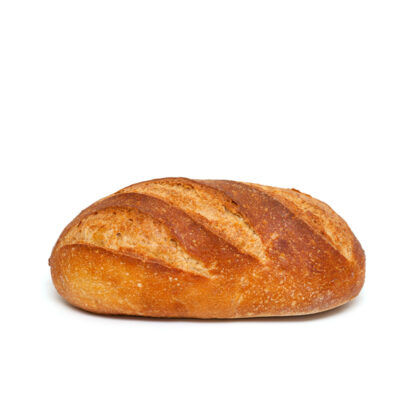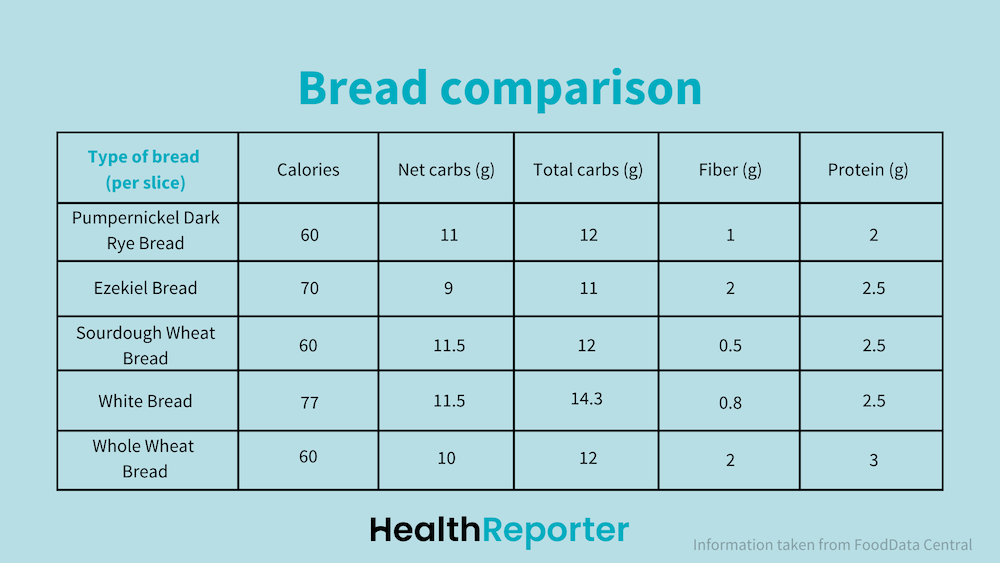Is Sourdough Bread Good for Diabetes? Facts Explained
Sourdough is full of nutrients and can be super beneficial to your general health. It typically has fewer calories and carbs than more conventional bread, but is it ok for people with diabetes? Discover the health benefits of eating sourdough bread and its impact on blood sugar levels.

Despite popular belief, people with diabetes can still eat and enjoy bread. The trick is to select the right kinds that won’t harm your blood sugar levels. With careful consideration, you can eat bread in moderation as part of a healthy diet.
The worst bread for a person with diabetes typically contains refined carbs, like white flour. While traditional sourdough is made with this flour, many starches and sugars decrease during fermentation. You can also make sourdough using whole-grain flour.
So, does this mean sourdough bread is a good match for diabetes? Does it affect blood sugar? Keep reading as we assess sourdough in detail, including macros, glycemic index, and benefits.
Is Sourdough Bread Good for Diabetes?
Yes, sourdough bread is a good choice for people with diabetes. Unlike other types of bread made using traditional baker’s yeast, the sourdough fermentation process causes changes to occur that may help control blood glucose levels. The high fiber content can also support glycemic control and help you better manage your weight.
Research suggests consumption of sourdough bread can improve postprandial blood glucose and insulin responses. The reasons for sourdough bread’s positive effects on blood sugar levels are not fully understood, but it may result from the lactic acid produced during fermentation.
Sourdough is one of the best bread choices for people with diabetes, alongside whole-grain and sprouted-grain bread. It’s best to select sourdough bread made from whole grains over those made with refined grains when possible for the greatest health benefits.
As with any bread, you must keep a close eye on how much you eat. Too much can disrupt your blood sugar levels. White sourdough bread is also high in calories, which may contribute to weight gain if you eat it excessively. Stick to smaller portions if you want to lose a few pounds.
Thank you for your answer
Health Reporter Surveys
Does sourdough bread spike your blood sugar?
Sourdough has a high carbohydrate content that can cause blood sugar levels to rise. However, sourdough has a low glycemic index and therefore shouldn’t cause spikes and crashes in blood sugar levels.
Foods with a lower-glycemic index are slowly digested and absorbed. They are more likely to cause a gradual rise in blood glucose and can help prevent insulin resistance. These foods are recommended for long-term blood sugar management in people with type 2 diabetes.
What Is Sourdough Bread?
Sourdough is ultimately a slow-fermented bread. It is unique from other bread varieties because it does not rely on commercial yeast to rise. Instead, it rises using a mix of fermented flour and water containing wild yeast and lactobacillus bacteria – a type of good bacteria. This is known as a sourdough starter.
The signature sour flavor and chewy texture come from the acids created in the sourdough starter during the fermentation process. Acetic acid, a key component of vinegar, provides sourdough’s tanginess.
Wild yeasts also have more flavor than your average commercial yeast that goes into other types of bread. Sourdough is highly versatile. It pairs perfectly with eggs and other low-carb, diabetes-friendly foods. You can also have a slice of this bread with garlic.
Nutritional Value of Sourdough
Aside from its distinctive taste, sourdough differs from other bread because it contains more antioxidants, minerals, and vitamins for diabetes management. The naturally-fermented sourdough is healthier than your average white or whole-wheat bread.
Let’s review the nutritional facts of sourdough bread. Below are the nutrients found in a 100g serving.

One slice of sourdough bread also has plenty of calcium, magnesium, phosphorus, and potassium, among other healthy minerals.
Glycemic Index of Sourdough
Sourdough bread has a glycemic index (GI) of 54. You can count sourdough as a low-glycemic-index food because it falls into the low category of foods with a GI rating of 55 or less.
The glycemic index is a measurement system that identifies how likely a carb-containing food is to affect your blood glucose levels. Eating a low-glycemic index diet can help people with type 2 diabetes minimize spikes in blood sugar and insulin levels.

Many low-GI foods cause your blood sugar to rise and fall slowly. This can help you feel full for longer, promote appetite control, and help you lose weight.
3 Benefits of Sourdough Bread
Sourdough bread has several health benefits. These benefits make it a suitable inclusion in a healthy diet for people with diabetes. It still contains carbohydrates and calories, so you should monitor how much you eat to ensure you don’t exceed your daily carb allowance.
Here are 3 perks to expect when you eat sourdough:
#1 Easier to digest
The fermentation process required to make sourdough may make it easier to digest than regular bread. The sourdough microbes, especially the lactic acid bacteria, support the gastrointestinal system.
It can improve digestion, promote the absorption of nutrients, and encourage better gut health. The natural process of making sourdough bread may be beneficial for people with gastrointestinal disorders, such as irritable bowel syndrome (IBS) and celiac disease.
It’s worth noting, however, that traditional sourdough bread is not gluten-free. Plus, eating more sourdough bread than necessary can cause mid adverse side effects. Fermented foods often cause an increase in gas and bloating.
#2 Natural probiotic
Like other fermented foods, sourdough bread is fermented with lactobacillus cultures that serve as probiotics. Probiotics are live bacteria and yeasts that have many benefits for gut health. Primarily, they improve and restore the natural balance of friendly bacteria in the gut.
These bacteria help you maintain a healthy digestive system, warding off illness and helping you feel better. By inhibiting the growth of harmful gut bacteria, probiotics can give your immune system a boost.
#3 Better blood sugar control
One slice of sourdough bread has 3.06g of fiber, an essential nutrient for blood sugar management. The body cannot absorb and break down fiber like other carbohydrates. Thus, it doesn’t spike blood sugar and helps keep levels within the goal range.
The fermentation in sourdough bread making causes changes to the carbohydrate molecules. The result is a lower glycemic index that slows the absorption of sugars into the bloodstream.
The slower, steadier pace contributes to greater blood sugar control. Blood sugar control is a critical aspect of diabetes management. Choosing foods that won’t trigger sharp spikes and crashes is the best way to maintain a healthy diabetes diet.
FAQs
Yes, sourdough is healthy because it contains lots of vitamins, minerals, and antioxidants. It has fiber, protein, carbohydrates, and moderate amounts of calcium, iron, potassium, manganese, and magnesium. It is high in calories, so you should still be mindful of overeating this tasty food.
Yes, sourdough is a low-glycemic food. Despite its high carbohydrate content, with just over 72g per slice, it remains in the low GI category. It means people with blood sugar control issues can safely enjoy it without worrying about blood sugar spikes and crashes.
Yes, sourdough bread is better for individuals with diabetes than wheat bread. Whole grains typically cause a slower rise in blood sugar levels, but wheat bread scores high on the glycemic index. It has a GI rating of 71, which means it may cause significant spikes in blood glucose.
Traditional sourdough is not gluten-free, although it typically contains less gluten than other bread made with commercial yeast. Making sourdough bread without gluten is possible, and you may find some store-bought products with a gluten-free label.
A Word From Our Nutritionist
Sourdough bread is fermented so that it provides more healthy bacteria, which supports your digestive system. It contains a variety of vitamins and minerals that may improve your day-to-day health. It’s considered healthier than white or whole-wheat bread.
As it has a low glycemic index, it can help regulate blood sugar and insulin levels more than varieties made from regular baker’s yeast. Of course, not all low-glycemic foods are healthy. You should still aim to eat nutrient-dense foods like green vegetables, fruits, and legumes.
Whole grains like brown rice, bulgar, oats, and buckwheat are great for individuals with diabetes. They tend to be more effective for blood glucose management. Sourdough made from whole grains is beneficial as it contains more nutrients. Try swapping white hamburger buns for a slice of sourdough bread.
You can benefit from following a low-carb diet for weight loss and glycemic control. Although sourdough bread has a large number of carbs, it doesn’t affect blood sugar levels like other carb-rich bread. It also has a low glycemic index, far lower than whole-wheat bread.
This kind of bread is unsuitable for the ketogenic diet because it has too many net carbs. Keto is good for diabetes because it promotes weight loss, improves insulin sensitivity, and has positive effects on blood sugar regulation. Many people also try fasting for diabetes.
Fermented foods like sourdough, pickles, and kombucha can encourage weight loss. Losing excess weight when you have diabetes is a bonus as it helps improve glycemic control and reduce the risk of cardiovascular events.
With any medical condition, getting professional medical advice from your doctor or nutritionist is vital before editing your diet. Arrange an appointment to discuss the best options for controlling diabetes in the best way possible.
Conclusion
Sourdough bread – is it a safe match for diabetes?
Yes, you can eat sourdough bread in limited quantities as part of your diabetes diet, along with other tasty whole grains like brown rice and quinoa.
If you’ve been avoiding it, adding more sourdough bread to your diet is safe, provided you keep tabs on your intake. Try a slice of sourdough bread to replace your usual white bread, or enjoy it as a tasty change from the whole grain variety.

















































 Select your language:
Select your language: 








